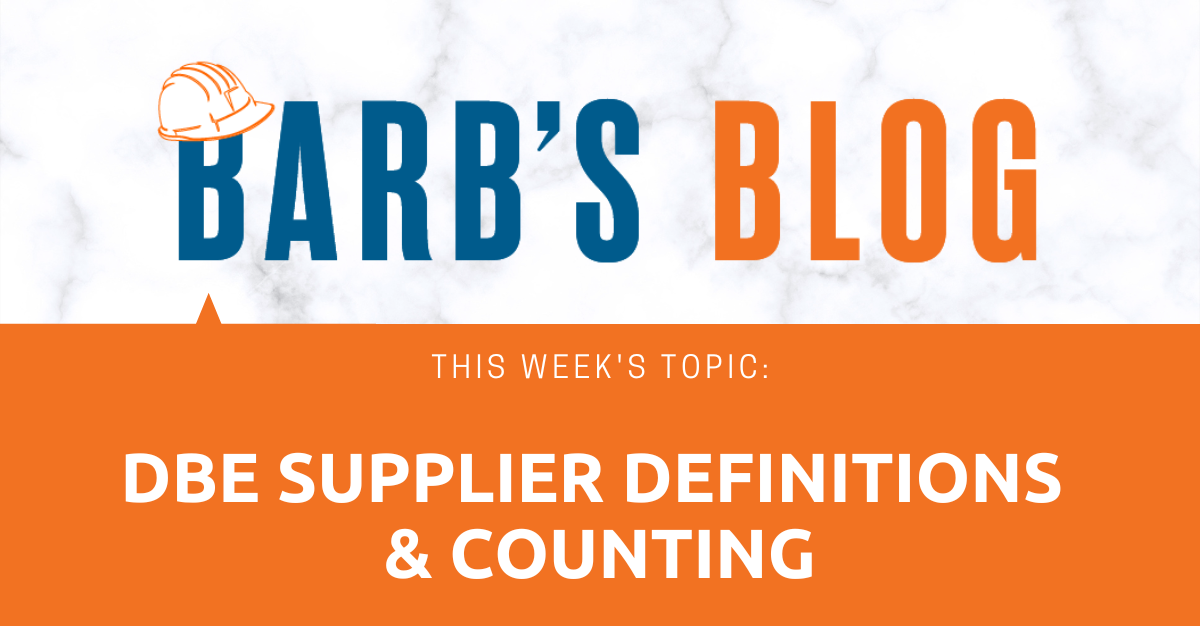
This is part 2 of the DBE Final Rule Change Blog Series. Click here to read part 1: “DBE Procedural Changes for Certification.”
DBE Final Rule Blog Series:
The Department of Transportation proposed new rules to the Disadvantaged Business Enterprise (DBE) program with public listening and comment period in 2022. The intent of the new rules was to modernize and improve the program, reduce burdens to firms, grow capacity and owner wealth and improve integrity and data for the program. The final rule changes went into effect May 9, 2024. All new rules are in effect as of May 9, 2024. Any decisions on applications after that date must use the new rules. I have been participating in training for the changes and in this series, I will break down the changes for you all in the different areas.
DBE Supplier Definitions & Counting
(Edited 9/10/2024)
One of the more significant changes in the new DBE rules involves DBE Suppliers. An additional category of DBE Supplier has been established in the new rules that went into effect on May 9, 2024. Each category has its own way of counting toward established goals. The updated categories and counting are as follows:
Manufacturer (Count at 100%): A firm that owns (or leases) and operates a factory or establishment that produces the materials, supplies, articles, or equipment required under the contract described by the specifications. Manufacturing includes blending or modifying raw materials or assembling components to create a product that meets the contract specifications. Note – a minor modification (small in scope and adding minimal value) does not deem a DBE the manufacturer and I recommend clarification from a contracting authority if in question.
Regular Dealer (Count at 60%): A regular dealer owns (or leases) and operates a store, warehouse or other establishment in which materials, supplies, articles or equipment of the general character in the specifications and required under the contract are bought, kept in sufficient quantities, and regularly sold or leased to the public in the usual course of business. To clarify – general character refers to like products. You cannot supply grass if you only inventory steel. Sufficient quantities means that a supplier maintains in inventory regularly, at an establishment they own or lease and operate, the supplies for the contract quantity. For example, if a supplier only maintains an inventory quantity at 50 of item X, bur typically sells quantities that exceed 150, they do not meet the definition of a DBE regular dealer. Note: At least 51% of the supplies must be provided from the DBE’s inventory.
Regular Dealer Bulk Supply (Count at 60%): A DBE may be a regular dealer in such bulk items as petroleum products, steel, concrete or concrete products, gravel, stone, or asphalt without owning and operating a place of business, if the firm both owns and operates distribution equipment used to deliver the products. Any supplementation of the regular dealers’ own distribution equipment must be by a long-term operating lease and not on an ad hoc or contract-by-contract basis. A DBE supplier of items that are not typically stocked due to their unique characteristics (e.g., limited shelf life or items ordered to specification) should be considered in the same manner as a regular dealer of bulk items. If the DBE supplier of these items does not own or lease distribution equipment, as described above, it is not a regular dealer.”
Distributor (Count at 40%): This is the NEW category and refers to a DBE who neither maintains sufficient inventory in an owned or leased establishment or uses its own distribution equipment for the products. A distributor is an established business that engages in the regular sale or lease of the items specified by the contract. Similar to the example above – You cannot supply glass if you don’t regularly sell it. A distributor assumes responsibility for the items it purchases once they leave the point of origin (e.g., a manufacturer’s facility), making the DBE liable for any loss or damage not covered by the carrier’s insurance. The DBE must demonstrate ownership of the materials at the time they ship from the manufacturer.
If a DBE does not meet the qualifications as a manufacturer, regular dealer nor a distributor, count only the amount of reasonable fees and commissions charged such as delivery charges. Do NOT count the cost of materials and supplies.
Another addition to the rules of suppliers is a preliminary counting determination for DBEs listed as regular dealers or distributors. This is to assess the eligibility for 60% or 40% credit. This will be done based on the DBE’s written responses to relevant questions and its affirmation that it will perform the duties as the preliminary counting determines. Form templates are being created at the federal level requiring signatures of both the DBE and prime and may need to be submitted with bids. The entities will determine what specifically their requirements will be.
The rules are meant to clarify the supplier designations and address drop ship items. This industry is still plagued with pass throughs, and the new rules are intended to clarify the parameters and end that practice. Under the new rule, the entities are required to create a system to determine whether a DBE is a regular dealer or distributor. This can be done through questionnaires, inventory records reviews, onsite visits, and bill of sale reviews. The system implemented must be used on all DBE suppliers to ensure a commercially useful function is being performed.
As the process is established, please keep in mind the parameters of the above counting criteria. If you have a question, ask the agency. Please – if you see something that doesn’t’ meet what the criteria says report it. If you aren’t comfortable doing that, contact me to report it.
DO NOT ASK DBEs TO SERVE AS A SUPPLIER OR DISTRIBUTOR THROUGH ILLEGITMATE MEANS. I hear stories every week from DBEs being asked to pass through supplies by the prime contractors. This needs to stop YESTERDAY. If you can’t meet the goal through legitimate DBEs, then you aren’t doing something right. If you made a true good faith effort to meet a goal and came up short that is ok (regardless of what some agencies expectations are). You can always contact me to help you understand best practices or help with outreach. I am here to support the diversity of the industry through legitimate means.
— B
This is part 2 of the DBE Final Rule Change Blog Series. Click here to read part 3: “DBE Status After Losing Certification During Contract Performance.”
